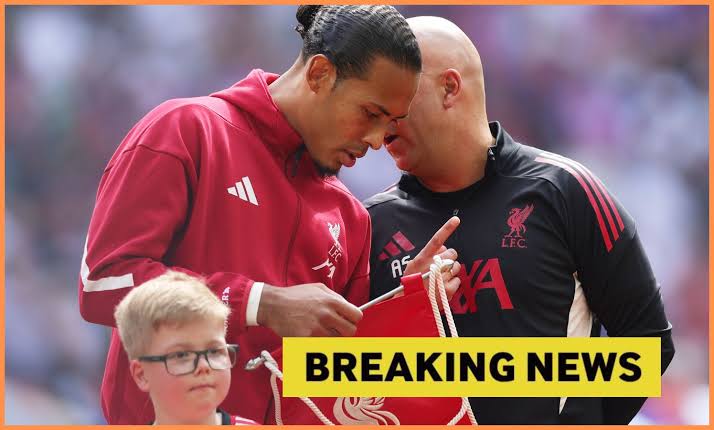Liverpool Ready to Pay €40 Million for Giovanni Leoni: A Comprehensive Analysis of the Transfer Saga

Liverpool Football Club has emerged as the frontrunner in the race to secure one of Italy’s most promising young defenders, Giovanni Leoni, with reports suggesting the Merseyside giants are prepared to meet Parma’s substantial €40 million valuation. This potential transfer represents not just another addition to Arne Slot’s squad, but a strategic investment in the future of Liverpool’s defensive structure
Giovanni Leoni’s meteoric rise through Italian football has been nothing short of remarkable. At just 18 years old, the versatile defender has already established himself as one of Serie A’s most exciting prospects, catching the attention of Europe’s elite clubs through his mature performances for Parma.
The young Italian’s journey began at Sampdoria’s youth academy, where he honed his skills and developed the tactical awareness that would later serve him so well in professional football. His move to Parma in the summer of 2024 initially raised eyebrows, with many questioning whether the teenager was ready for the rigors of Serie A football. However, those doubts were quickly dispelled as Leoni demonstrated a level of composure and technical ability that belied his tender years.
During his debut season with Parma, Leoni’s development trajectory followed a classic pattern of gradual integration. The first half of the campaign saw him primarily used as a squad player, gaining valuable experience through training sessions and occasional substitute appearances. This period was crucial for his adaptation to senior football, allowing him to understand the pace and physicality of Serie A while working under the guidance of experienced coaches.
The turning point came in the second half of the season when injuries and suspensions opened up opportunities in Parma’s starting eleven. Leoni seized these chances with both hands, delivering performances that showcased not only his defensive solidity but also his ability to contribute to the team’s attacking play. His breakthrough moment came when he was entrusted with a starting position in a crucial league fixture, and he responded by putting in a man-of-the-match performance that announced his arrival on the big stage.
Giovanni Leoni’s playing style represents the modern evolution of defensive football. Standing at an impressive 6’2″, he possesses the physical attributes necessary to compete at the highest level, but it’s his technical skills and football intelligence that truly set him apart from his contemporaries.
As a central defender, Leoni demonstrates exceptional reading of the game, often intercepting opposition attacks before they develop into dangerous situations. His positioning is remarkably mature for such a young player, suggesting an innate understanding of defensive principles that typically takes years to develop. This spatial awareness allows him to cover for teammates and make crucial interventions that break up play without resorting to last-ditch challenges.
His ball-playing ability is perhaps his most impressive attribute. In an era where center-backs are expected to initiate attacks from deep positions, Leoni excels at bringing the ball out of defense and finding teammates with precise passes. His passing range includes everything from simple short passes to maintain possession to sweeping long balls that can switch the point of attack or find forwards in dangerous positions.
The versatility that Leoni has shown throughout his young career adds another dimension to his appeal. While primarily deployed as a center-back, his comfortable performances at right-back demonstrate his adaptability and tactical flexibility. This versatility is increasingly valuable in modern football, where squad rotation and tactical variations demand players who can operate effectively in multiple positions.
His pace and acceleration are notable assets, allowing him to recover quickly when caught out of position and to track fast-moving attackers. This physical capability, combined with his excellent timing in tackles and aerial duels, makes him a formidable opponent for any striker.
Liverpool’s interest in Giovanni Leoni must be understood within the broader context of their defensive restructuring under Arne Slot. The Dutch manager has identified the backline as an area requiring significant investment, with the club actively pursuing multiple targets to address various defensive positions.
The pursuit of Leoni runs parallel to Liverpool’s efforts to secure Marc Guehi from Crystal Palace, indicating a comprehensive approach to defensive reinforcement. This dual targeting suggests that Slot envisions a complete transformation of Liverpool’s defensive setup, moving away from the aging core that served Jurgen Klopp so well and building a foundation for the next decade.
Slot’s tactical philosophy places heavy emphasis on ball-playing defenders who can contribute to the team’s build-up play. His preferred system requires center-backs who are comfortable receiving the ball under pressure and can make progressive passes to initiate attacks. Leoni’s technical profile aligns perfectly with these requirements, making him an ideal fit for Slot’s vision.
The timing of this potential transfer is particularly significant. With several of Liverpool’s current defenders entering the latter stages of their careers, the club faces the challenge of maintaining competitive standards while planning for the future. The acquisition of young, talented players like Leoni represents a proactive approach to squad planning, ensuring continuity of quality even as established players eventually move on.
Financial considerations also play a role in Liverpool’s transfer strategy. The €40 million price tag for Leoni, while substantial, represents relatively good value in today’s inflated transfer market, especially for a player with such significant potential. The club’s willingness to invest this amount demonstrates their confidence in Leoni’s ability to develop into a world-class performer.
Liverpool’s pursuit of Giovanni Leoni is not unopposed, with Inter Milan representing the most significant competition for his signature. The Italian giants have their own compelling reasons for targeting the young defender, primarily centered around addressing their aging defensive line.
Inter’s interest stems from their need to rejuvenate a backline that has served them well but is beginning to show signs of age. Players like Francesco Acerbi and Stefan de Vrij, while still capable performers, are in the twilight of their careers, making succession planning a priority for the Nerazzurri. Leoni’s emergence as one of Serie A’s most promising young defenders makes him an obvious target for a club looking to maintain their competitive edge while planning for the future.
However, Inter faces significant financial constraints that could hamper their ability to compete with Liverpool’s spending power. The Italian club’s revenue streams, while substantial, cannot match those of Premier League giants, particularly when it comes to transfer fees and wage offers. This financial disparity could prove decisive in determining Leoni’s eventual destination.
The appeal of remaining in Italy, where Leoni is already established and comfortable, cannot be understated. Moving to Inter would allow him to continue his development within a familiar footballing culture while competing at the highest level in both Serie A and European competitions. The opportunity to work with experienced defenders and learn from seasoned professionals could accelerate his development in ways that a move abroad might not.
Nevertheless, Liverpool’s financial advantages and the allure of Premier League football present compelling counter-arguments. The opportunity to work under Arne Slot’s guidance, learn from world-class teammates, and compete in what many consider the world’s most competitive league offers a different but equally valuable development pathway.
For Parma, the potential sale of Giovanni Leoni represents both an opportunity and a challenge. The €40 million asking price reflects not only the player’s current ability but also the club’s assessment of his future potential. This valuation places Parma in a strong negotiating position, particularly given the interest from multiple top-tier clubs.
The Serie A club’s decision to set such a high price demonstrates their understanding of modern transfer market dynamics. In an environment where young talents command premium fees, Parma is positioning itself to maximize the return on its investment in Leoni’s development. The club invested time and resources in nurturing the defender’s talents, and the potential transfer fee represents validation of their developmental approach.
However, Parma also faces the reality of their position in football’s hierarchy. As a club with limited financial resources compared to Europe’s elite, the opportunity to generate significant transfer revenue could be transformative for their own squad-building efforts. The €40 million from Leoni’s sale could fund multiple signings that strengthen various positions throughout their squad.
The timing of this potential transfer also works in Parma’s favor. With several years remaining on Leoni’s contract, they hold considerable leverage in negotiations. This contractual security allows them to set their price and wait for the right offer, rather than being forced into a quick sale due to expiring terms.
From a sporting perspective, losing Leoni would undoubtedly weaken Parma’s defensive options. His emergence as a key player during the second half of the previous season made him integral to their tactical setup. However, the financial benefits of his sale could enable the club to invest in multiple areas of improvement, potentially making them stronger overall despite losing their most valuable asset.
Arne Slot’s appointment as Liverpool manager marked the beginning of a new tactical era at Anfield. The Dutch coach brings with him a distinct footballing philosophy that emphasizes possession-based play, high pressing, and fluid movement between lines. Within this system, the role of center-backs extends far beyond traditional defensive duties.
Slot’s ideal center-back must be comfortable in possession, capable of playing out from the back under pressure, and able to contribute to the team’s attacking phases through precise passing and occasional forward runs. This profile describes Giovanni Leoni almost perfectly, explaining Liverpool’s keen interest in securing his services.
The young Italian’s ability to play accurate long passes could prove particularly valuable in Slot’s system. Liverpool’s attacking players thrive on quick transitions from defense to attack, and having a center-back who can find them with precise passes from deep positions adds another dimension to their offensive play. Leoni’s range of passing, demonstrated throughout his time at Parma, suggests he could excel in this role.
Defensively, Slot’s high-line approach requires center-backs with pace and recovery speed. Leoni’s athletic attributes make him well-suited to this style of play, as he can track back quickly when the defensive line is breached and has the pace to compete with fast-moving attackers in one-on-one situations.
The tactical flexibility that Leoni offers could also prove valuable in Slot’s rotation plans. His ability to play at right-back provides the manager with additional options for squad rotation and tactical adjustments during matches. This versatility is particularly important in a season where Liverpool will compete across multiple competitions and face varying tactical challenges.
The €40 million price tag attached to Giovanni Leoni reflects several factors that characterize the modern transfer market. Youth, potential, and proven ability at a reasonable level have become increasingly valuable commodities as clubs look to balance immediate competitiveness with long-term planning.
From Liverpool’s perspective, this investment represents sound financial planning. Young players with high potential often appreciate in value, meaning that even if Leoni doesn’t immediately establish himself as a first-team regular, his market value could increase significantly over time. This potential for appreciation makes such transfers less risky from a financial standpoint.
The fee also reflects the premium placed on players who are already performing at a high level in one of Europe’s top leagues. Unlike signings from lower divisions or less competitive leagues, Leoni has already proven his ability to compete against top-quality opposition, reducing the risk associated with the transfer.
Liverpool’s willingness to invest such a significant sum in a teenage defender also signals their confidence in their scouting network and development programs. The club’s recent success in nurturing young talents and transforming them into world-class performers provides reassurance that this investment could yield substantial returns.
The broader market context also supports Parma’s valuation. With inflation affecting transfer fees across the board and the increasing scarcity of high-quality young defenders, €40 million for a player of Leoni’s profile and potential appears reasonable within current market parameters.
From Giovanni Leoni’s perspective, the opportunity to join Liverpool represents a significant step forward in his career trajectory. At 18 years old, he stands at a crucial juncture where the next move could define the path of his professional development.
The appeal of working under Arne Slot’s guidance cannot be understated. Slot’s reputation for developing young players and his tactical expertise offer Leoni the opportunity to refine his skills under one of Europe’s most respected coaches. The Dutch manager’s track record of improving players and helping them reach their potential makes Liverpool an attractive destination for ambitious young footballers.
The competitive environment at Liverpool would also accelerate Leoni’s development. Training alongside world-class players on a daily basis, competing for starting positions against established internationals, and experiencing the pressure of competing for major trophies would all contribute to his growth as a player.
However, the move to Liverpool also presents challenges that Leoni must carefully consider. The immediate competition for places in the starting eleven could limit his playing time in the short term, potentially affecting his development trajectory. The pressure and expectations at a club of Liverpool’s stature are significantly higher than those at Parma, requiring mental strength and resilience to succeed.
The cultural and linguistic challenges of moving to England should not be overlooked either. While many Italian players have successfully adapted to Premier League football, the transition requires time and adjustment. Leoni’s young age could be both an advantage and a challenge in this regard – while younger players often adapt more quickly to new environments, they may also be more susceptible to homesickness and cultural difficulties.
To understand the significance of Liverpool’s pursuit of Giovanni Leoni, it’s valuable to compare him with other young defenders who have made similar moves in recent years. This comparison provides context for both the transfer fee and the expectations surrounding his potential development.
Players like Matthijs de Ligt, Josko Gvardiol, and Castello Lukeba all made high-profile moves to major clubs at young ages, providing templates for how such transfers can unfold. De Ligt’s journey from Ajax to Juventus and eventually to Bayern Munich demonstrates how young defenders can develop into world-class performers when given the right environment and guidance.
Leoni’s statistical profile compares favorably with these players at similar stages of their careers. His pass completion rates, aerial duel success, and defensive actions per game all indicate a player with the fundamental skills necessary to succeed at the highest level. What sets him apart is his combination of physical attributes and technical ability, a blend that is increasingly rare in modern football.
The Italian’s age advantage also works in his favor. At 18, he has more time to develop and adapt to new tactical systems than older prospects. This extended development window reduces the pressure for immediate impact while maximizing the potential return on investment for any acquiring club.
The pursuit of Giovanni Leoni fits into Liverpool’s broader transfer strategy under the new ownership and management structure. The club has shifted towards a more sustainable approach to squad building, focusing on younger players with high potential rather than established stars approaching their peak years.
This strategy reflects several practical considerations. Younger players typically have longer contract periods, providing better value for money and reducing the frequency of expensive contract renewals. They also offer greater potential for value appreciation, making them sound investments from both sporting and financial perspectives.
The emphasis on youth also aligns with Arne Slot’s coaching philosophy. The Dutch manager has consistently demonstrated his ability to develop young players and integrate them into successful teams. His work at Feyenoord showcased this talent, as he transformed several promising youngsters into established first-team players while achieving significant success.
Liverpool’s approach also reflects the changing dynamics of modern football transfers. With established stars commanding increasingly prohibitive fees and wages, clubs are looking to identify and secure promising talents before they reach peak market value. The Leoni transfer exemplifies this approach – acquiring a player with demonstrated ability and enormous potential before his value skyrockets.
Integrating Giovanni Leoni into Liverpool’s tactical framework would require careful planning and gradual introduction. Arne Slot’s system demands specific qualities from defenders, and while Leoni possesses many of these attributes, the adaptation period is crucial for maximizing his potential contribution.
In Slot’s preferred formation, center-backs are expected to step forward with the ball and initiate attacks through progressive passing. Leoni’s comfort in possession and his ability to pick out teammates with accurate passes make him well-suited to this role. His experience playing out from the back at Parma has prepared him for the increased responsibility he would face at Liverpool.
The high defensive line that characterizes Slot’s approach would play to Leoni’s strengths. His pace and recovery speed make him capable of dealing with the spaces left behind when the team presses high up the pitch. This attribute is particularly valuable in matches against counter-attacking teams, where defensive speed can be the difference between maintaining control and conceding dangerous chances.
Leoni’s aerial ability adds another dimension to Liverpool’s defensive arsenal. His height and jumping reach make him effective in dealing with crosses and set-pieces, areas where the team has sometimes struggled in recent seasons. This strength could prove particularly valuable in Premier League football, where aerial battles remain a significant component of defensive play.
The versatility that allows Leoni to play at right-back could also prove tactically valuable. This flexibility gives Slot additional options for squad rotation and in-game adjustments, allowing him to maintain tactical coherence even when making multiple changes to the starting eleven
The potential acquisition of Giovanni Leoni represents a long-term investment in Liverpool’s defensive future. At 18, he would arrive at Anfield with the expectation of gradual integration rather than immediate first-team impact, allowing for a carefully managed development pathway.
The initial phase of his Liverpool career would likely involve a combination of first-team appearances, training integration, and possible loan spells to gain regular playing time. This approach has proven successful with other young acquisitions, allowing players to adapt to the club’s culture and tactical demands while maintaining their competitive sharpness.
Liverpool’s academy and development infrastructure provide an ideal environment for nurturing young talents. The club’s training facilities, coaching expertise, and player development programs have consistently produced world-class performers. Leoni would benefit from access to cutting-edge sports science, tactical analysis, and mental coaching support.
The presence of experienced defenders in Liverpool’s squad would also aid Leoni’s development. Learning from seasoned professionals, understanding their approach to game preparation, and observing their decision-making processes would accelerate his own growth as a player.
Looking ahead five years, the successful integration of Leoni could see him emerge as Liverpool’s defensive leader. His combination of technical ability, physical attributes, and football intelligence suggests he has the potential to become one of Europe’s premier center-backs. This long-term vision justifies the substantial investment required to secure his signature
The potential transfer of Giovanni Leoni to Liverpool for €40 million would have significant implications for the broader transfer market, particularly regarding the valuation of young Italian defenders and the competition between Premier League and Serie A clubs for emerging talents.
This transfer fee would establish a new benchmark for teenage defenders, potentially influencing the valuations of similar prospects across Europe. Other clubs with promising young center-backs would likely reference this deal when setting their own asking prices, contributing to further inflation in the youth transfer market.
The successful completion of this transfer would also demonstrate Liverpool’s continued ability to compete financially with Europe’s biggest clubs. Despite recent changes in ownership and management, the club’s willingness to invest significantly in young talent shows their commitment to maintaining competitiveness at the highest level.
For Italian football, losing another promising young player to the Premier League would represent a concerning trend. The financial disparity between English and Italian clubs has led to a consistent drain of talent from Serie A to the Premier League, potentially weakening the competitiveness of Italian football over time.
Like all major transfers, Liverpool’s pursuit of Giovanni Leoni carries both opportunities and risks that must be carefully evaluated. Understanding these factors is crucial for assessing the likelihood of success and the potential return on investment.
The primary risk lies in the adaptation challenges that any young player faces when moving to a new league and country. The Premier League’s pace and physicality differ significantly from Serie A, and not all players successfully make this transition. Leoni’s youth could be both an advantage and a disadvantage in this regard – while younger players often adapt more quickly, they may also be more susceptible to the pressures of playing for a major club.
Injury concerns represent another risk factor, particularly given the physical demands of Premier League football. Any significant injury during the crucial early period of his Liverpool career could derail his development and integration into the team. However, his clean injury record at Parma provides some reassurance in this regard.
The success factors for this transfer include Liverpool’s proven track record in developing young talents, Slot’s expertise in player development, and the club’s excellent support infrastructure. The presence of other young players in the squad could also help Leoni settle more quickly and feel part of a emerging generation of Liverpool stars.
The financial aspects of Liverpool’s pursuit of Giovanni Leoni extend beyond the initial €40 million transfer fee. Contract structure, wage progression, and performance-related bonuses all play crucial roles in determining the overall cost and success of the transfer.
Modern transfer deals often include various performance-related clauses that can increase the total fee based on the player’s achievements. These might include appearances for club and country, team success in competitions, and individual accolades. Such structures help align the interests of all parties while providing cost efficiency for the buying club.
Leoni’s wage package would need to reflect both his current status as a promising youngster and his potential future value. Liverpool’s wage structure typically rewards performance and development, meaning that successful integration into the first team would be accompanied by commensurate financial rewards.
The length of the initial contract is another important consideration. Longer deals provide security for both player and club while protecting the investment made in transfer fees. However, they also need to include appropriate progression clauses to ensure that the player’s compensation reflects his development and contribution to the team.
The timing of Liverpool’s pursuit of Giovanni Leoni within the current transfer window adds urgency to negotiations. With the window’s closure approaching, both clubs face pressure to conclude any deal quickly to avoid missing out on the opportunity.
This time pressure could work in Liverpool’s favor, as their financial strength allows them to move quickly when necessary. Their ability to meet Parma’s asking price without lengthy negotiations over payment structures or add-ons could prove decisive in securing the transfer.
However, last-minute transfers also carry additional risks. Rushed medical examinations, abbreviated negotiation periods, and compressed integration timelines can all affect the success of the transfer. Both clubs would need to ensure that all aspects of the deal are properly structured despite the time constraints.
The player’s own decision-making process becomes crucial in such scenarios. Leoni’s reported keenness to join Liverpool simplifies negotiations but also puts pressure on him to make a career-defining decision within a compressed timeframe
Liverpool’s readiness to pay €40 million for Giovanni Leoni represents more than just another transfer – it signals the club’s commitment to building for sustained success under Arne Slot’s leadership. The young Italian defender embodies the type of player that modern football demands: technically gifted, tactically intelligent, and physically capable of competing at the highest level.
The convergence of factors – Liverpool’s need for defensive reinforcement, Leoni’s desire for a new challenge, and Parma’s willingness to sell at the right price – creates an opportunity that could benefit all parties involved. For Liverpool, securing Leoni would represent a significant step forward in their defensive rebuild and a statement of intent regarding their future ambitions.
The success of this potential transfer will ultimately be measured not just by immediate impact, but by Leoni’s development over the coming years. If he successfully adapts to Premier League football and fulfills his considerable potential, this €40 million investment could prove to be one of the most astute signings in Liverpool’s recent history.
As the transfer window enters its final phase, the football world watches with interest to see whether this promising young defender will make the leap from Serie A to the Premier League. For Giovanni Leoni, this represents the opportunity of a lifetime – the chance to join one of world football’s most prestigious clubs and take his career to new heights.
The coming days will reveal whether Liverpool’s financial commitment and Leoni’s ambition align to create one of the transfer window’s most significant moves. If completed, this transfer would not only strengthen Liverpool’s defensive options but also send a clear message about their intentions for the upcoming season and beyond. For more Liverpool transfer news and analysis, stay tuned to TheHardTackle’s comprehensive coverage of the summer transfer window.















